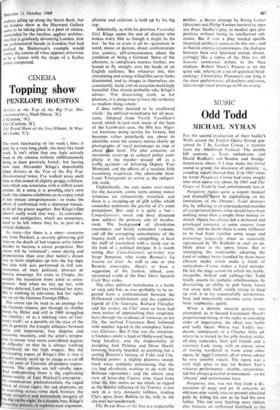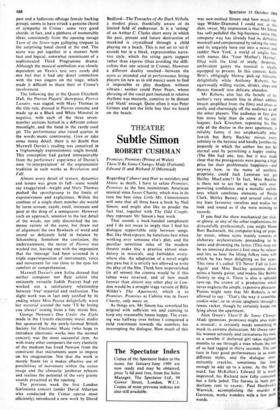MUSIC
Odd Todd
MICHAEL NYMAN
For the second production of their Sadler's Wells season the English Opera Group pre- sented In 2 by Gordon Crosse, a transfer from the Aldeburgh Festival. The double bill contains a Yeats melodrama and David Rudkin's sub-'Bootsie and Snudge' manoeuvre about, if 1 may make the trivial sound so grand, the discovery of identity : a, coupling wttich showed that, if in 1965 when he wrote Purgatory Crosse had some insight into what opera was about, by 1967 and The Grace of Todd he had unfortunately lost it.
Purgatory_ flakes quite a cogent musical and dramatint by capitalising on the limitations of the libretto ; Todd destroys this by inflating to an unprecedented number of exasperation'points what should have been nothing more than a simple three minute TV sketch. Opera has always led a sheltered and privileged existence at some remove from reality, and no doubt there is some titillation to be had from familiar army usage and posturings (especially when so accurately reproduced by M( Rudkin) in such an un- likely place as the opera house. But in attempting the inadvisable—adopting the kind of subject better handled by those more efficient media which make a fetish of naturalism—Crosse makes a fatal mistake. He lets the stage action (in which the feeble. incapable, bullied and cabbage-like Todd finally asserts his pathetic rebelliousness by discovering an ability to pull funny faces) run away with itself, vainly trying to keep up with it in his resourcefully anonymous, busy and remarkably uncomic score (trom- bone raspberries apart).
When a definite musical gesture was attempted, as in Second Lieutenant Shard's preposterous listing of the ranks in ascending order of importance, the effect was feeble and sadly banal. Worse was Todd's day- dream, reminiscent of a Charles Atlas ad. where he is visited by his jolly-hockey-sticks, off-duty comrades, their girl friends and a visionary Lady (sung, with an uneasy sense of having wandered in from some other opera, by April Cantelo), all of whose advice he very sensibly rejects. The opera was a very high price to pay for Robert Tear's virtuoso performance—shabby, uncoordina- ted but always graceful in movement—as the 'obscese' and unfortunate hero.
Purgatory, too, was not free from a dis- sociation of stage and pit. It concerns an old man who vainly tries to prevent inherited guilt by killing his son as he had his own father. This not very fetching story (which also features an ineffectual flashback to the past and a ludicrous offstage female backing group), seems to have struck a genuine chord of sympathy in Crosse: some very good chords, in fact, and a plethora of memorable ideas, consistently from the opening savage Turn of the Screw-type galloping timpani to the surprising tonal chord at the end. The score was put together in a manner both taut and logical, somewhat reminiscent of a sophisticated Third Programme drama. Although the musical symbolism was closely dependent on Yeats's text very rarely did one feel that it had any direct connection with the two singers on the stage, which made it difficult to share their or Crosse's involvement.
The following day at the Queen Elizabeth Hall, the Pierrot Players' showpiece, Pierrot Lunaire, was staged, with Mary Thomas in the title role, dressed in Pierrot costume and made up as a Black and White Minstrel in negative, with each of the three seven- number sections bathed in a different colour moonlight, and the band in the rarely-used pit. The performance also raised queries in the words/music controversy. Give or take some messy detail, there is no doubt that Maxwell Davies's reading was conceived in a frighteningly expressionistic single mould. This conception had gained immeasurably from the performers' experience of Davies's own 're-interpretation' of the expressionist tradition in such works as Revelation and Fall.
Almost every detail of texture, dynamics and tempo was given its full—some would say exaggerated—weight and Mary Thomas pushed the sprechgesang to the limits of expressiveness and explicitness. Within the confines of a single short number she would by turns scream, cajole, exult, insinuate and pout at the drop of a semiquaver. However such an approach, sensitive to the last detail of the words, not only diminished the im- mense variety of the score, but threw out of alignment the two flywheels of word and sound so delicately held in balance by Schoenberg. Somehow the confusion, the understatement, the terror of Pierrot was washed out, leaving one with the impression that the 'message' had been screened in a triple superimposition of instruments, voice and movement far too close to the eyes for comfort or comprehension.
Maxwell Davies's own Solita showed that neither composer nor flute soloist (the eminently versatile Judith Pearce) had yet worked out a satisfactory relationship between 'free' material and realisation. The slight work was in fact only justified by its ending where Miss Pearce delightfully wove her material around the tune 'I'll be loving you always' issuing from a tiny music box.
George Newson's One Under the Eight made in the Utrecht electronic music studio but sponsored by the newly-formed British Society for Electronic Music (who hope to introduce electronic works into the normal concert) was the most successful item. As with many other composers the very elasticity of the medium has freed Newson from the constraint that instruments seem to impose on his imagination. Not that the work is merely fluent for it makes effective use of possibilities of movement within the stereo image and the climactic jamboree releases and realises the potential of the very grainy sounds presented at the opening.
The previous week the first London Sinfonietta concert (under David Atherton who conducted the Crosse operas most efficiently) introduced a new work by David Bedford—The Tentacles of the Dark Nebula, a modest piece, thankfully aware of its limited field of endeavour. It is a 'setting' of an Arthur C. Clarke short story in which the past, present and future destruction of mankind is crystallised through a child playing on a beach. This is not set to `sci-fi' sounds but in a bleak, expressionless narra- tive style, which the string parts support rather than express (thus avoiding the diffi- culties that one sensed in Crosse). However a different duality resulted—between the score as intended and in performance. String players (in new as in old music) seem to find it impossible to play deadpan, without vibrato ; neither could Peter Pears, whose phrasing of the vocal part (notated in relative rhythm) was masterly, contrive to be distant and 'blank' enough. Quite often it was Peter Grimes and not the little boy that we heard on the beach.











































 Previous page
Previous page